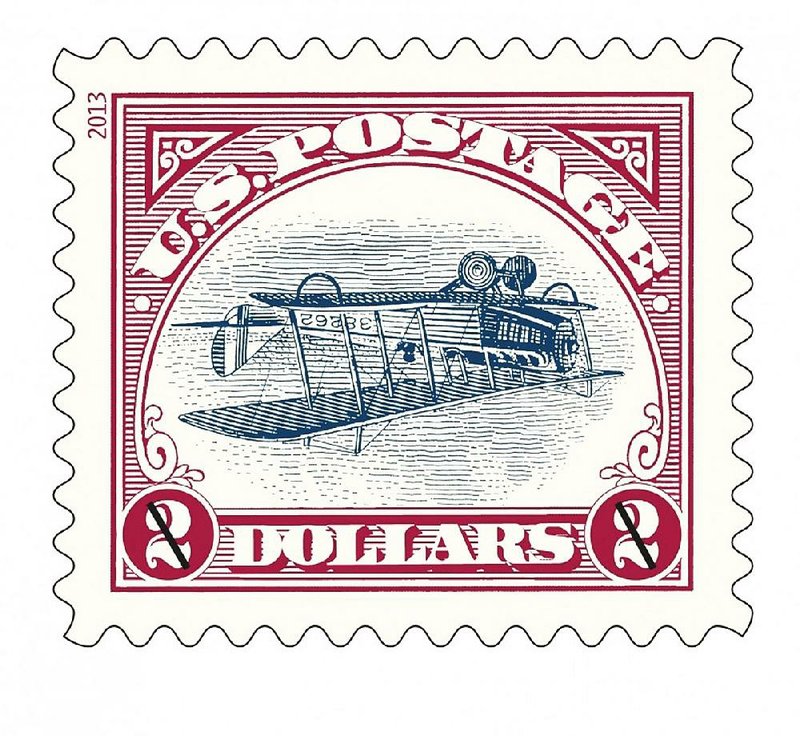WASHINGTON -- The U.S Postal Service did something unprecedented when it tried to increase stamp sales and kick-start public excitement about collecting: It reprinted the most famous stamp error in history, known as the Inverted Jenny.
Now the agency's watchdog has called the instant, manufactured stamp rarity issued in 2013 a huge mistake that broke the agency's own rules, which prohibit postal officials from intentionally creating a rare stamp just to make money.
"The Postal Service created and improperly distributed a philatelic rarity," a management alert issued by Inspector General David Williams said. Postal officials "strongly and inappropriately influenced the secondary [stamp] market by creating the rarity."
Just 20 of the 100 mini-sheets of six stamps designed as a twist on what became one of the world's most famous and valuable stamps have been registered as sold, investigators found.
The upright Jenny was one of the first stamps to commemorate the start of air mail. It was issued at 24 cents in 1918 to commemorate the first mail carried on an experimental air service between Washington and New York. It showed a Curtiss JN-4 biplane, or "Jenny" -- but in its haste to print the stamp, the Postal Service accidentally sold one sheet of 100 stamps with the airplane in the center of the image upside down.
The Jennies became instant collectors' items. Only one sheet of the inverts was ever found. A single stamp sold at auction in 2007 for $977,500.
Inside the Postal Service, reprinting the stamps seemed like a smart move as the marketing office tried to enhance the visibility of new stamps to engage collectors and entice new, younger ones. The trend included commercial stamps like a Harry Potter series and Rudolph the Red-Nosed Reindeer, which rolled out around the same time as the Jennies.
The marketing staff came up with a modern twist on the error: A run of 2.2 million stamps with the airplane face down, but just 100 sheets with the plane face up. Those would thrill collectors.
But the intentional Jenny misprints, which have a face value of $2 for six stamps, infuriated collectors. They called it a gimmick, because the chance they would stumble on the new sheets was tiny. Still, one upright Jenny Invert pane sold for $51,750 and another for $55,000 in 2014, the inspector general noted. Still, the office received numerous complaints from collectors about the reissue.
The report noted that while Postal Service stamp policy is "vague," it clearly states that "Postal Service employees should refrain from intentionally creating philatelic rarities and does not include any exceptions" -- even influence from the postmaster general.
But in this case, the Postal Service's governing board, former postmaster general Patrick Donahoe and the agency's general counsel were aware of the plan to reissue the rare stamp. The plan to distribute it was not approved by the legal department, and that plan got into trouble, investigators found.
Each stamp sheet is individually wrapped, so no one can see the stamps before they are bought. A note is included with the right-side-up rarities, alerting buyers that they've hit a philatelic goldmine.
The Postal Service hoped to sell all 2.2 million stamp sheets in the first 60 days, bringing in $26.4 million in revenue, the report said. But as of four months ago, sales had raised only $13 million.
Postal officials gave 70 upright panes to post offices to distribute randomly to buyers. The 30 remaining panes were sent to the agency's stamp fulfillment services office in Kansas City, Mo., to ship to customers who ordered the Jennies by mail.
But in Kansas City, officials "forgot" about their distribution plan for the newly created stamps, investigators found. They shipped just one pane between March 2014 and December 2014. As a result, 23 upright panes remain in Kansas City.
What will happen to the Jennies sitting in storage in Missouri is unknown.
SundayMonday on 07/26/2015

